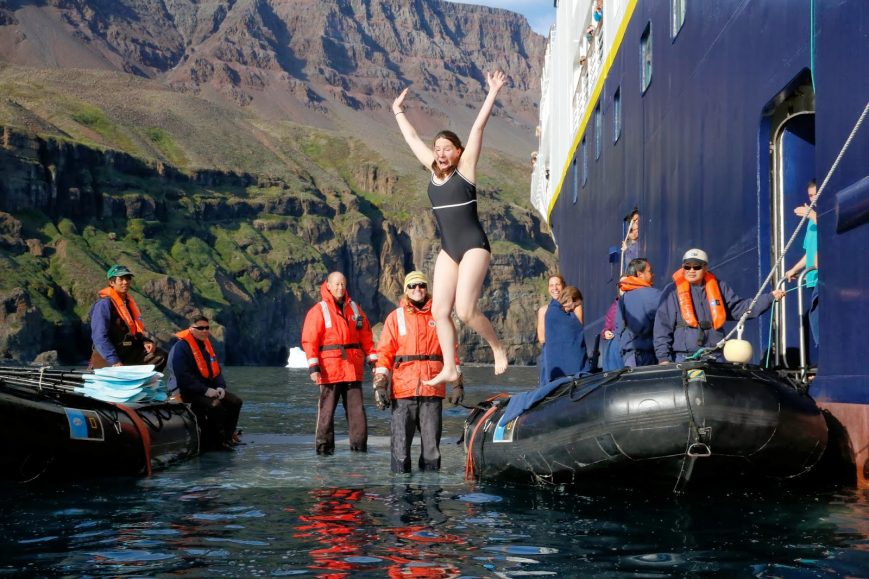Teaching the teachers with arctic exploration
Educators become arctic fellows to bring polar science into their classrooms

Crystal Thiele takes a polar plunge into ice-cold arctic waters as part of the Grosvenor Teacher Fellow Program.
Michael Nolan
In 2006, Sven Lindblad, the head of Lindblad Expeditions, was fitting out a ship to take scientists and ecotourists to the arctic. Inspired by the passionate educational work of the National Geographic Chairman Emeritus Gilbert Grosvenor he decided to set aside cabins for educators on ships embarking to Svalbard, Norway; the high arctic; Iceland; the Canadian Maritime Islands and Antarctica. Along the way, his company partnered with National Geographic Education, and the Grosvenor Teacher Fellow Program was born.
Why take teachers on expeditions? “Young people now are going to inherit an increasingly complex world,” Lindblad says. “There are huge changes happening in our natural systems, the oceans and the forests. It’s going to have a profound effect on how they navigate their future. If you take a student you take a student. But if you can take a teacher on an expedition, they can come back and touch many students and many peers. There’s an exponential value to each teacher.”
This year, 25 teachers will embark on trips to destinations around the world, each lasting from nine days to more than two weeks. The program has expanded to include Antarctica. As they sail, teachers will meet with naturalists and photographers, attend lectures on the local flora and fauna, hike islands and glaciers, take polar plunges and just generally get up close and personal with wildlife.
Crystal Thiele, a fifth grade teacher at P.S. 321 in Brooklyn, N.Y., was a 2013 fellow. Her travels took her up the east coast of Canada, around Baffin Island and to the west coast of Greenland. She kept a blog documenting her experiences. When Thiele got home again, she began incorporating the things she saw and did into her teaching materials. She included lessons on Arctic peoples, animals and plants. “I also talked about what the trip was like,” she recalls. “Most of my students have never been on a ship before.”
But Thiele didn’t stop there. She invited her previous class — now sixth graders — back for an “arctic reunion.” She also visited the second grade classes while they were learning about biomes. Thiele even had Lindblad come to give a presentation to her class. “My kids don’t often get to meet someone so well-traveled,” she explains.
Daniel Snare, a science teacher at Warren Tech, a career and technical high school in Lakewood, Colo., traveled to Svalbard as a fellow in 2010. He didn’t try to bring back too much hard science. “I teach chemistry in a culinary arts class and make sure the students get their academic requirements for science,” he says. Moreover, he notes, “it’s hard to connect whales to welding.”
Instead, Snare made videos of people who worked on the ship. “I did video interviews with the welders, the cooks, the information-technology guys and the photographers,” he recalls. His goal was to show kids “that you don’t have to stay in Colorado to be a welder; you can be a welder on a ship and see the world. You can be a cook on a cruise ship. You can take your skills, travel the world and see new things.”
The program currently accepts 25 fellows per year, but Lindblad plans to double that number in 2015. The trips are funded by Lindblad Expeditions, National Geographic and other sponsors. That means teachers travel for free. They are required to attend a three-day workshop before their voyage, commit to virtual meetings, participate in an online community and serve as “ambassadors” for the program in the future. The application for the 2015 class will open in November.
Follow Eureka! Lab on Twitter
Power Words
Antarctica A continent mostly covered in ice, which sits in the southernmost part of the world.
expedition A journey (usually relatively long or over a great distance) that a group of people take for some defined purpose, such as to map a region’s plant life or to study the local microclimate.
information (as opposed to data) Facts provided or trends learned about something or someone, often as a result of studying data.
naturalist A biologist who works in the field (such as in forests, swamps or tundra) and studies the interconnections between wildlife that make up local ecosystems.
technology The application of scientific knowledge for practical purposes, especially in industry.
Updated 7/14/14 to correct Crystal Thiele’s name. In addition, the National Geographic site has incorrect locations of travel for the 2014 fellows. This year fellows will travel to Svalbard, Norway; Iceland; Greenland; The Canadian Maritimes and Antartica.